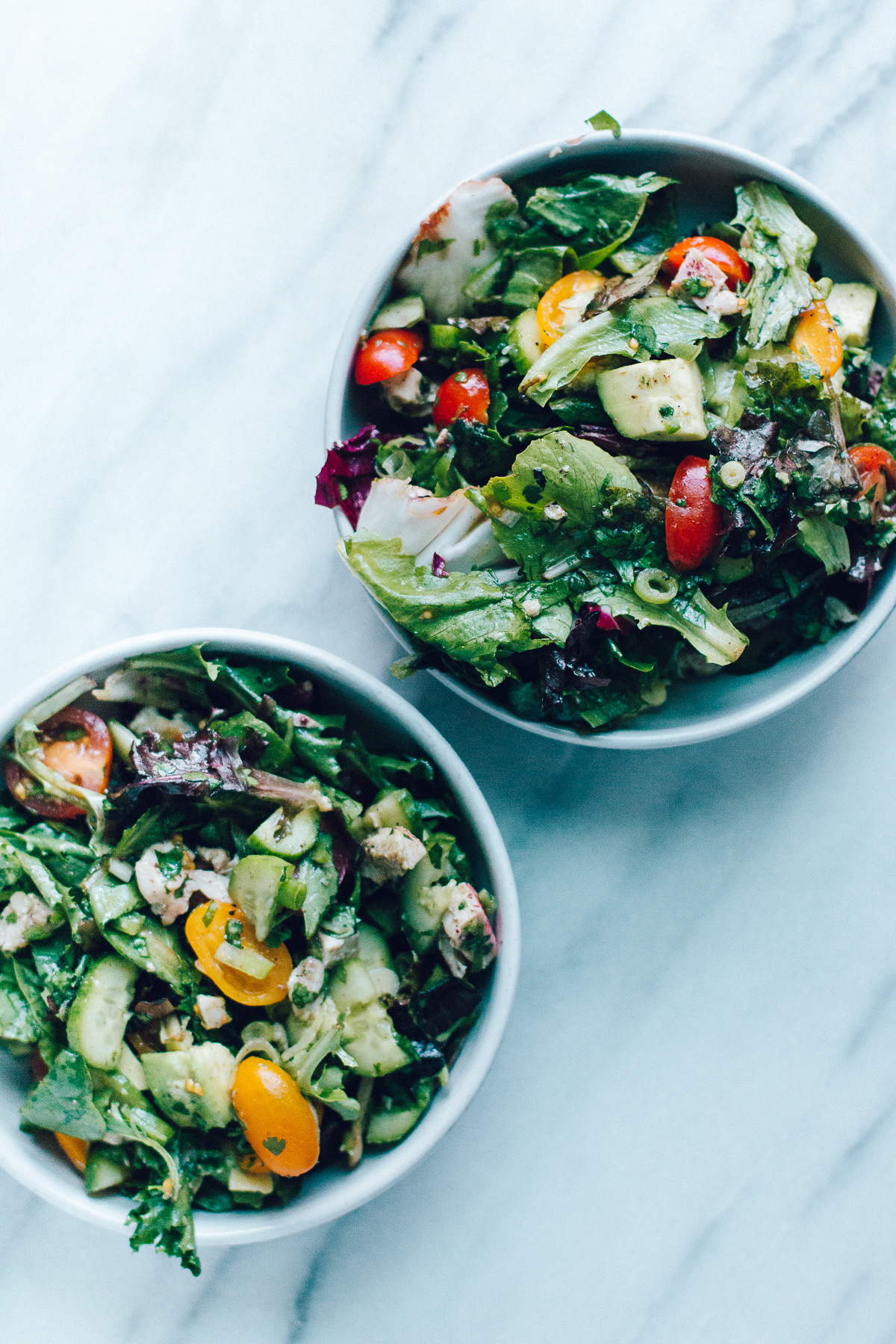Resources
Style
Planning
View All
THE blog
By: Anabelle Harari Clebaner MS, RDN
Diet impacts everything
Want to boost fertility? 🌟 Start with what’s on your plate. Yep, your diet can make a HUGE difference.
When it comes to fertility, adequate nutrition plays a pivotal role. The right nutrients can significantly influence your reproductive health, improving your chances of conception and a healthy pregnancy.
As a fertility dietitian, I know firsthand just how much nutrition makes an impact on your reproductive health, after working with hundreds of women in my private practice, Wellspring Nutrition.
Think of it this way – you have three opportunities every single day to make a healthy choice that nourishes your body for fertility and pregnancy.
So let’s get right into it – here are 5 foods you can start to incorporate or increase in your diet to start to see positive changes in your fertility.
Leafy greens: The superstars 🌿
Spinach, kale, and their leafy friends are packed with folate, iron, and antioxidants.
Folate is essential for: DNA synthesis and repair, embryonic development, and preventing neural tube defects.
Folic acid is crucial for both men and women. For women, it helps create a healthy environment for egg fertilization and early embryonic growth. For men, it supports healthy sperm production.
Iron is essential for: Hemoglobin production and oxygen transport.
Adequate iron levels prevent anemia, which can affect ovulation and overall energy levels, making your body more conducive to conception.
These nutrients are your fertility BFFs. Add them to salads, smoothies, or soups. Easy peasy!
Fatty fish: Omega-3 magic 🐟
We can’t have a conversation about Omega-3 fats without also talking about Omega-6 fats.
Both Omega-3 and Omega-6 fatty acids are essential polyunsaturated fats, meaning your body cannot produce them, and they must be obtained through your diet. Despite being in the same family of fats, they have different roles and effects on the body.
The three most important types are:
– **EPA (Eicosapentaenoic Acid)**: Found in fatty fish such as salmon, mackerel, and sardines. – **DHA (Docosahexaenoic Acid)**: Also found in fatty fish and is a crucial component of brain and eye health.
– **ALA (Alpha-Linolenic Acid)**: Found in plant sources like flaxseeds, chia seeds, and walnuts.
ALA can be converted to EPA and DHA in the body, but this process is relatively inefficient.
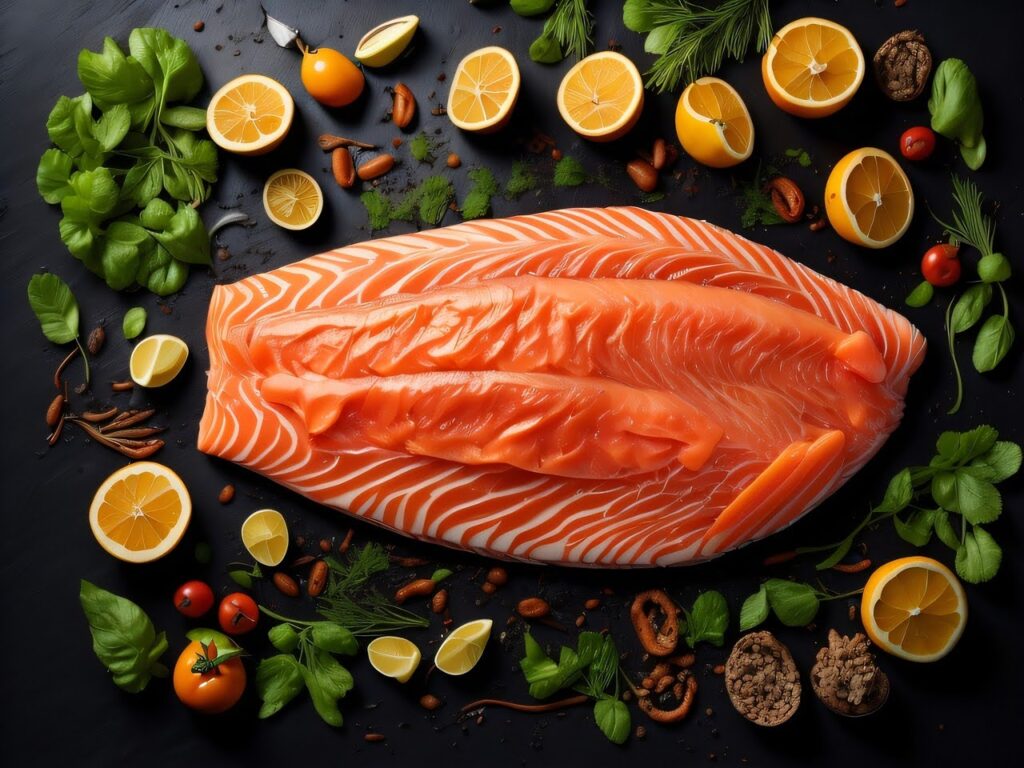
Health Benefits
**Anti-Inflammatory**: Omega-3s help reduce inflammation in the body, which can lower the risk of chronic diseases such as heart disease and arthritis. – **Cardiovascular Health**: They are known for their heart-protective effects, reducing blood pressure, and improving cholesterol levels. – **Mental Health**: Omega-3s play a crucial role in brain health and have been linked to reduced symptoms of depression and anxiety. – **Fertility**: As mentioned earlier, they improve egg quality, regulate ovulation, and reduce the risk of endometriosis.
Omega-6 Fatty Acids
Types
The most common type is: – **LA (Linoleic Acid)**: Found in vegetable oils like sunflower, soybean, and corn oil. – **AA (Arachidonic Acid)**: Found in meat and eggs; it is derived from LA. – **GLA (Gamma-Linolenic Acid)**: Found in evening primrose oil and blackcurrant seed oil; it’s a less common omega-6.
Health Benefits
**Pro-Inflammatory and Anti-Inflammatory**: Omega-6 fats can produce both pro-inflammatory and anti-inflammatory compounds. The body’s balance of omega-6 to omega-3 determines the effect. – **Skin Health**: Omega-6 fatty acids can help support skin barrier function and hydration. – **Growth and Development**: Essential for normal growth and brain function, particularly in children.
Key Differences
**Balance and Ratio** – **Ideal Ratio**: Historically, humans consumed Omega-3 and Omega-6 fats in a balanced ratio of about 1:1 to 1:4. However, modern diets tend to have a ratio closer to 1:20 or 1:30, significantly skewed towards Omega-6, leading to an imbalance.
**Health Impact**: An imbalanced ratio (high in Omega-6 and low in Omega-3) can promote inflammation and contribute to chronic diseases. Ensuring an adequate intake of Omega-3s while reducing excessive Omega-6s can optimize health.
Sources
**Omega-3s**: Primarily found in fatty fish (salmon, mackerel, sardines), flaxseeds, chia seeds, walnuts, and algae.
**Omega-6s**: Found mostly in vegetable oils, nuts, seeds, and processed foods. They are more prevalent in the typical Western diet.
While both Omega-3 and Omega-6 fatty acids are essential for health, maintaining a proper balance between them is crucial. Increasing your Omega-3 intake and being mindful of Omega-6 consumption can help in achieving better overall health and reducing the risk of chronic diseases.
Omega-3 Fatty Acids are Essential for: Reducing inflammation, hormone production, and cell membrane function.
Omega-3 fatty acids are known to improve egg quality, regulate ovulation, and reduce the risk of endometriosis. For men, they improve sperm quality and mobility.
So where do you find Omega-3 fatty acids? Salmon, mackerel, and sardines are where it’s at. These fatty fish are fertility wonders. Grill ’em, bake ’em, or toss ’em in a salad. Your future self will thank you.
Nuts and seeds: Tiny powerhouses 🥜
Pumpkin seeds, walnuts, and almonds are considered tiny powerhouses because they are bursting with zinc and selenium. When it comes to fertility, both zinc and selenium play critical roles in ensuring optimal reproductive health. These essential trace minerals are involved in numerous bodily functions, specifically those related to reproductive health for both men and women.

Zinc
Zinc is vital for:
- Hormone Regulation: Zinc helps in regulating hormone levels, particularly testosterone in men and estrogen and progesterone in women. Balanced hormone levels are crucial for a healthy reproductive system.
- Sperm Production and Quality: In men, zinc is essential for spermatogenesis, the process of sperm production. It also enhances sperm motility and morphology, crucial factors for successful fertilization.
- Ovulation: For women, zinc supports the maturation of eggs and ensures regular ovulation, which is essential for conception.
- DNA Synthesis: Zinc is involved in DNA synthesis and cell division, processes that are fundamental during the early stages of fetal development once conception occurs.
Selenium
Selenium contributes to fertility by:
- Antioxidant Support: Selenium acts as a powerful antioxidant, protecting reproductive cells from oxidative stress, which can damage sperm and eggs.
- Thyroid Function: Proper thyroid function, supported by selenium, is crucial for fertility. The thyroid gland regulates many metabolic processes, including those that affect reproductive health.
- Sperm Quality: In men, selenium is essential for the formation and motility of sperm. It helps in maintaining the integrity and function of sperm cells.
- Development: Selenium plays a role in the early stages of embryo development by ensuring proper DNA synthesis and protecting against cellular damage.
Snack on them, throw them in your oatmeal, or mix them in a trail mix – there’s no way to go wrong here! And if you want to learn more about seed cycling, check out this blog right here.
Berries: Antioxidant champs 🍓
Blueberries, strawberries, and raspberries are loaded with antioxidants. These little champs keep your reproductive system in top shape. Enjoy them fresh, frozen, or in a smoothie. Yum!
Antioxidants are compounds that help protect the body from oxidative stress, which is caused by an excess of free radicals—unstable molecules that can damage cells.
Free radicals are naturally produced during metabolism, but environmental factors like pollution, UV exposure, and poor diet can increase their levels.
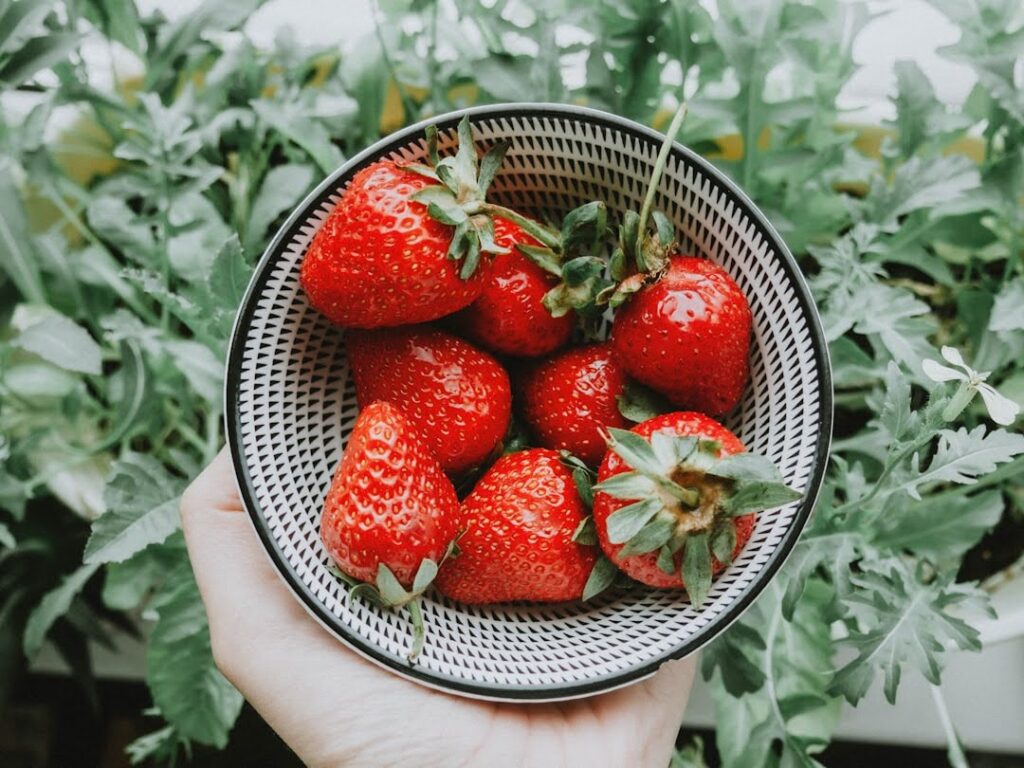
Berries Images – Free Download on Freepik
Importance of Antioxidants for Fertility
1. **Protecting Reproductive Cells**: Antioxidants help neutralize free radicals, reducing oxidative stress on reproductive cells like sperm and eggs. This protection is crucial for maintaining the health and viability of these cells.
2. **Improving Egg Quality**: Oxidative stress can negatively affect egg quality, leading to issues like chromosomal abnormalities. Antioxidants can improve the quality and viability of eggs by reducing this stress.
3. **Enhancing Sperm Health**: In men, antioxidants play a vital role in protecting sperm from oxidative damage, which can affect sperm count, motility, and overall fertility.
4. **Supporting Hormonal Balance**: Certain antioxidants, like vitamin E and Coenzyme Q10, are involved in hormone production and regulation, which is essential for fertility.
5. **Reducing Inflammation**: Antioxidants like vitamin C, E, and selenium have anti-inflammatory properties, which can help reduce inflammation in the reproductive organs, supporting overall fertility.
Including a variety of antioxidant-rich foods like berries, nuts, seeds, leafy greens, and colorful vegetables can be beneficial for those looking to optimize their fertility.
Eggs: The complete package 🍳
Eggs—especially organic, free-range ones—are amazing. They’re packed with choline and protein, both super important for fertility. Scramble them, poach them, or make a frittata. So versatile!
Eggs are an excellent food for fertility, and one of the key reasons is their high content of choline, an essential nutrient that plays a significant role in reproductive health.

Eggs Pictures [HD] | Download Free Images on Unsplash
Choline and Fertility
1. **Cell Membrane Formation**: Choline is crucial for the formation and maintenance of cell membranes. This is particularly important during pregnancy, as it supports the development of the baby’s brain and nervous system. In the context of fertility, choline ensures the health and integrity of reproductive cells, such as eggs and sperm.
2. **Gene Expression**: Choline is involved in methylation, a process that regulates gene expression. Proper methylation is essential for DNA synthesis and repair, which is vital for healthy cell division and the development of a viable embryo.
3. **Reducing Neural Tube Defects**: Adequate choline intake during pregnancy is associated with a lower risk of neural tube defects in the developing baby. For those trying to conceive, ensuring sufficient choline intake can help prepare the body for a healthy pregnancy.
4. **Supporting Hormone Production**: Choline is a precursor to acetylcholine, a neurotransmitter that plays a role in muscle control and memory but also supports hormone production and regulation. Balanced hormone levels are crucial for ovulation and overall reproductive health.
Other Nutrients in Eggs
In addition to choline, eggs are packed with other nutrients that support fertility:
– **Protein**: Eggs are an excellent source of high-quality protein, essential for the growth and repair of tissues, including reproductive tissues.
– **Healthy Fats**: The healthy fats in eggs, including omega-3 fatty acids, support hormone production and reduce inflammation.
– **Vitamins and Minerals**: Eggs are rich in vitamins like B12, D, and A, as well as minerals like selenium and zinc, all of which play important roles in reproductive health.
Practical Tips
– **Whole Eggs**: Most of the choline in eggs is found in the yolk, so it’s important to consume whole eggs rather than just egg whites.
– **Balanced Diet**: Including eggs as part of a balanced diet can provide a variety of essential nutrients that collectively support fertility. Pairing eggs with other fertility-boosting foods like leafy greens, avocados, and whole grains can further enhance their benefits.
Incorporating eggs into your diet, especially for those looking to boost fertility, is a simple and effective way to ensure you’re getting enough choline and other vital nutrients.
Conclusion: Make it a habit
So, there you have it—the top 15 fertility-boosting foods – phew! That was a lot. Start adding these to your daily meals to reap all the benefits!
And if you’re looking for a super easy way to incorporate these foods, and so many others that are vital for fertility, check out my four-week fertility meal plan.
It was designed to take all of the nutrients important for fertility and translate it into delicious, healthy, and simple recipes to naturally nourish your fertility.
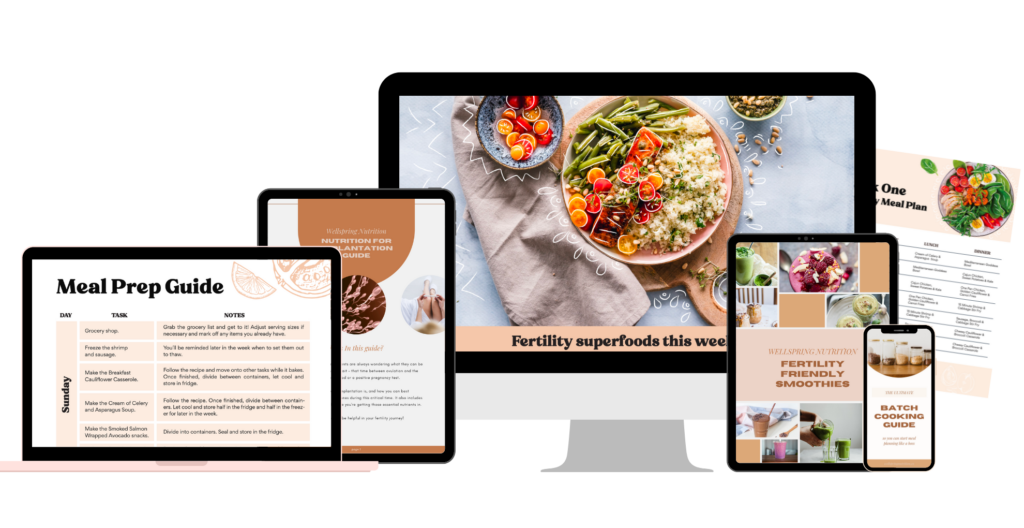
Whether you’re planning your next IUI cycle or are just getting started on your preconception journey, investing in your health is always worth it!
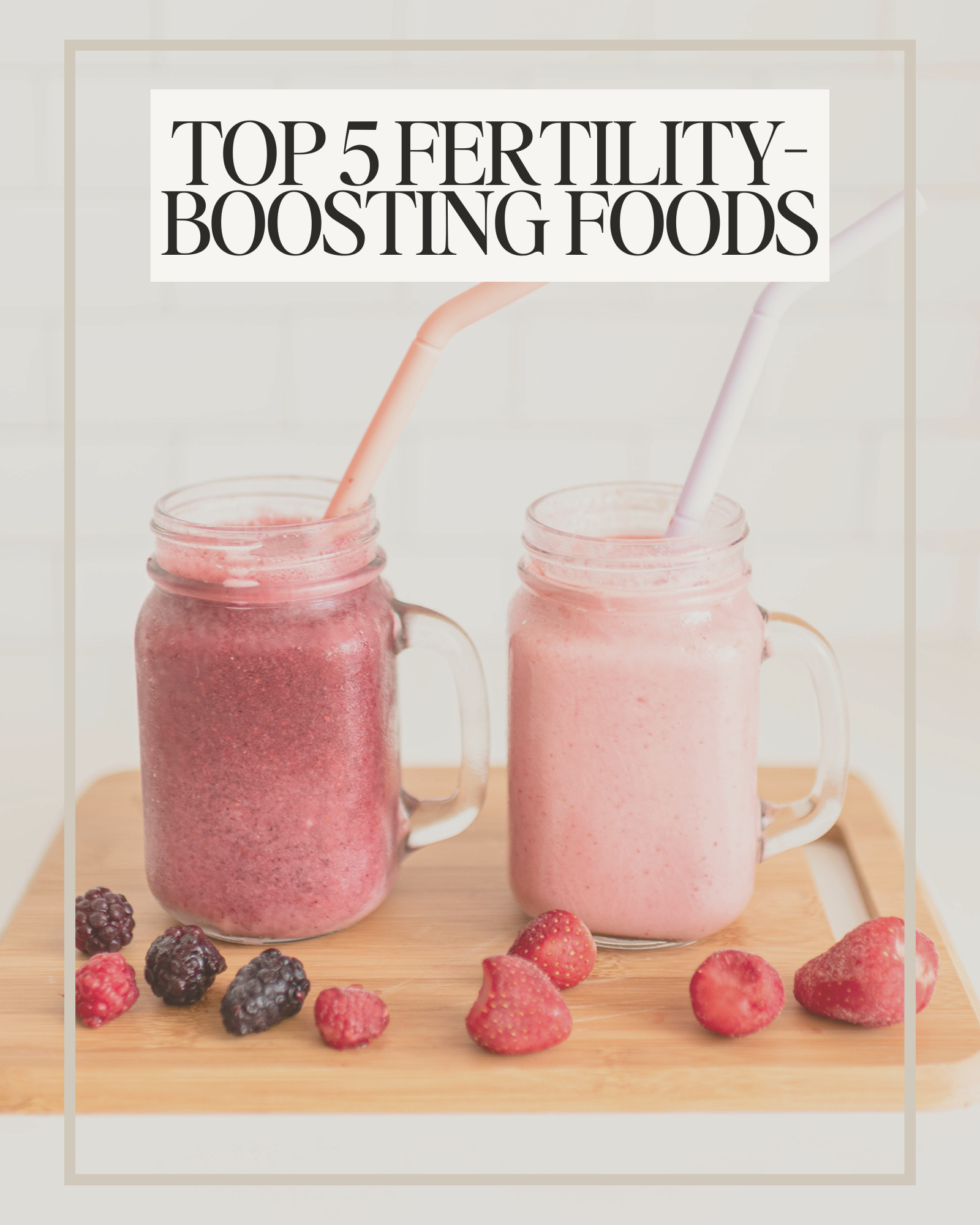
You may be thinking – I don’t need to work with a fertility dietitian / nutritionist, I already eat pretty healthy (weekend margs don’t count right?), I exercise, drink my green juices … and besides, I can get any nutrition information I really need through Google.
Well, my friend… I’m here to break down five benefits of working with a fertility dietitian nutritionist, specifically one that works in a functional nutrition capacity. I think some of these may surprise you!

1. Breaking down your relationship with food
Okay, we all have our issues with food. To say that eating is not emotional… well it’s just not what I’ve seen in my practice and in life. We all eat emotionally from time to time, even if it’s happy emotions like birthday cake, or holiday meals.
But when our relationship to food becomes restrictive or consumes our thoughts, it’s time to work with a professional who understands what you’re going through.
For many women struggling with fertility, food can be very time consuming. We’re told not to eat gluten or dairy or cut out coffee completely. We’ve heard of different fertility diets, and can easily spiral into the trap of thinking that every bite we take is going to either get us pregnant or leave us feeling miserable.
Working with a fertility dietitian that can help you set up your meals in a way that supports your fertility, but also leaves room for enjoyment is key. I mean, what is a life without pizza anyway?
2. Accountability

Raise your hand if you’ve ever tried to take on a new hobby or something to improve yourself only to find yourself giving up a few weeks later? 👋🏼
A few years ago, I decided I wanted to take up surfing – I bought a foam board off Craigslist, rented a wet suit, and out I went into the ocean. As I splashed around the water, and even got tumbled by some waves I felt exhilarated by the cold Pacific ocean and glimmer of water in the sun.
Maybe I went out a few more times, but soon enough, I lost momentum. I didn’t have anyone to go with, no one to learn some new moves with or a partner to go with before or after work.
We all have the best of intentions when we start something new. But having accountability is key. And your dietitian is always going to keep you accountable to what you said you wanted for yourself.
3. Test, don’t guess
When you work with a functional nutrition dietitian (hey, hello!) – you’re likely going to be introduced to some new functional lab tests. Tests like the DUTCH hormone test, GI MAP stool test, Spectracell micronutrient testing, food sensitivity testing and more.

The reason for this is because you’ve likely already had some conventional lab tests done in the past. The problem with this is that you’re still trying to get pregnant and have no answers. By the way… “unexplained infertility” is not an answer.
This is where a deeper dive into your gut, hormones, and nutrient levels is so important. For example, most people don’t realize that they’re probably deficient in vitamin D – a key vitamin (that acts as a hormone) needed for fertility.
Or maybe you’ve had heavy periods your whole life, but didn’t realize that your messed up gut health is actually impacting your estrogen levels, causing you to put on weight, and have heavy painful periods.
Working with a functional nutrition dietitian is going to be key to understanding the root cause of your issues.
4. You have PCOS and you’re kind of freaking out
One of the most common hormone disrupting conditions for women of reproductive age is PCOS. It can feel really scary when you get the diagnosis and you may think you’ll never be able to get pregnant without hormone therapy – WRONG. Just wrong.
Instead of jumping to medications and pills, you can work with a fertility dietitian who will help you manage your diet and lifestyle specifically for PCOS, so that you can have regular periods, and optimize your chances of getting pregnant naturally.
PCOS is not a death sentence, and there are plenty of women with the condition who get pregnant (and have healthy pregnancies) without assistive reproductive technology.

5. You know your diet could be better and you just want to make sure you have a healthy pregnancy
Well, good on you girl for being uber prepared for pregnancy.
Did you know that the best time to start taking prenatal vitamins and working on your diet is actually 6 months BEFORE you plan to start trying?
Working with a fertility dietitian is going to be huge for you, because you’re making sure you get all the nutrients you and baby need, so by the time that first trimester rolls in and all you want is bagels and crackers- you’ve already stored up the necessary nutrients to ensure baby is getting everything they need.

So tell me, which one applies to you? If you’re thinking you might benefit from working with a fertility dietitian, book your free discovery call with me today.
We’ll talk through what your goals are and how I might be able to help you on your journey towards becoming a mama.

Last year I hosted a free 5 day habits challenge in an effort to help my community stick to five easy healthy habits. We focused on drinking enough water throughout the day, meditating daily, eating our greens, getting enough sleep, and exercising. These five habits are things we should all be doing, but often fall short.
Today, I wanted to dive deep into the psychology behind habit formation, and how you can actually start and maintain habits for life. Let’s jump in!
If you’re looking for a few simple ways to boost your metabolism, this will be the perfect blog post for you. I know there’s a ton of nutrition information on the internet (some credible, some not) – but when it comes to metabolism, there’s a few key things you need to know before we dive in to the nitty gritty.
The Preconception Playbook
This free playbook provides specific actionable tips to get started on your fertility journey, as well as what to avoid while you're trying to conceive.
Get the free playbook


